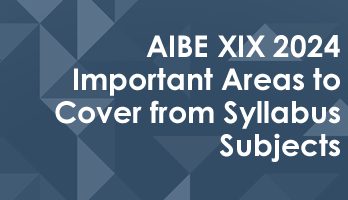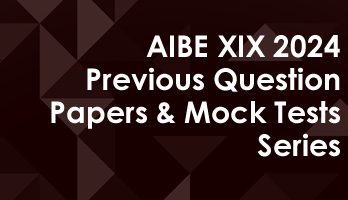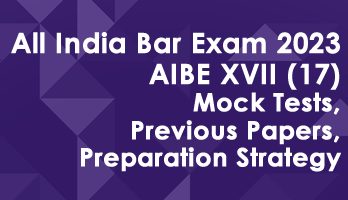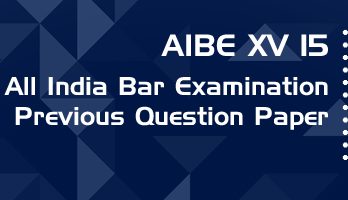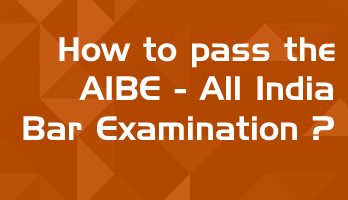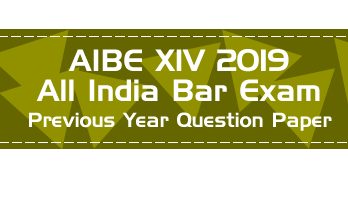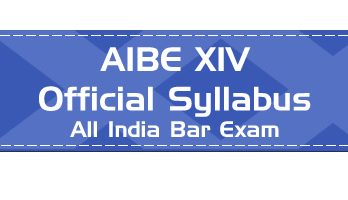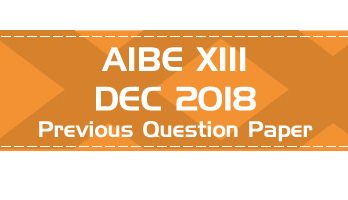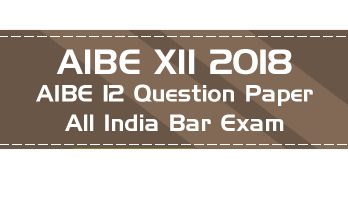This is the free previous question paper from AIBE IV or AIBE 4, the fourth edition of the All India Bar Examination that was held in 2011.
- Updated as per the latest AIBE Syllabus & Pattern
- 15 AIBE Previous Question papers - AIBE IV to XVIII
- 15 Full-length mock tests as per latest pattern
- All Questions with Answers and Explanations
- Access valid for one year from date of purchase
- Accessible 24 x 7 via Smart-Phone, Tablets and Desktops
- Free Sample Mock Test - Try Before You Buy
Authentic Feedback from previous LawMint users :
I got AIR 21 in CLAT PG. Thank you so much. Your mocks helped me a lot in my preparation 🙂 - Ayushi Jain
I have subscribed to your CLAT PG program and got AIR 36 in this year CLAT PG. I have also secured AIR 54 in AILET PG exam. I would like to thank you. Your mock paper really helps a lot - Shrashank Tripathi
I would like to thank you for the CLAT PG LLM COURSE. Practising mock tests there helped me in getting confidence and hence I was able to get AIR 45 in CLAT PG LLM - Akshay Awasthi
A year back, I relied on the IIT Kharagpur RGSOIPL mock test series by LawMint to prepare for my RGSOIPL entrance test. Few months back, I relied on your UGC NET Law series to prepare for UGC NET. I was the topper of the RGSOIPL entrance, and have cracked JRF in UGC NET. All thanks to LawMint - Anshuman Sahoo
"I got AIR 18 in CLAT PG and General Category rank 28 in AILET PG. I want to thank you for helping me practice well in controlled conditions from any place. It gave me a lot of confidence and I took the tests while travelling too. I also made it to IIT Kharagpur." - Vinodharani
"Lawmint has been of great help to me in securing AIR 25 in AILET PG and AIR 29 in CLAT PG examinations. The subjective and objective approach of the test series kept me up to date with the latest exam pattern." - Bhawna Nanda
"I, Nimmy Saira Zachariah joined you clat test series. I cleared AILET PG with 30th rank. Your test series were of immense help as it gave me clear idea of where my preparations stand thank you once again law mint." - Nimmy S Z
"Hey guys. Where do I start? If I thought that getting AIR 59 in Clat PG was it, then how wrong I was. With Lawmint now I have cracked UGC NET as well." - Joyanta Chakraborty
The answers ( answer keys ) for all previous question papers published on LawMint.com are available only for users registered for LawMint.com AIBE Online Prep Courses.
1. An agreement in restraint of trade not accompanied by a sale of goodwill, is
A. Voidable at the option of either party.
B. A valid contract.
C. Voidable at the option of the promisor.
D. Voidable at the option of the promise.
E. Expressly declared void.
2. An agreement is not voidable if consent is caused by
A. Mistake as to an Indian law.
B. Misrepresentation.
C. Coercion.
D. Fraud.
E. Undue Influence.
3. An advocate cannot directly or indirectly bid for or purchase (either in the advocate’s own name, or in any other name) property for the advocate’s own benefit or for the benefit of any other person
A. When the property is sold in the execution of a decree or order in any suit, appeal, or other proceeding in which the advocate was in any way professionally engaged
B. When it is property that the client may legally purchase or bid for.
C. When the client has expressly authorized the advocate to bid on his behalf.
D. When it involves a share or interest in an actionable claim.
E. None of the above.
4. Art arbitral tribunal should usually consist of
A. A sole arbitrator.
B. Three arbitrators.
C. Any even number of arbitrators.
D. Any odd number of arbitrators.
E. Any odd number of arbitrators, though if the parties continue with an even number of arbitrators, the parties are deemed to have waived their right to challenge a common award by such an arbitral on the ground that there was an even number of arbitrators.
5. Certain acts that lie within an Exception, such as that the defendant was of unsound mind when committing the act charged as an offence, are not treated as offences. Who has the onus of proving that an act lies within an Exception?
A. The prosecution must prove that the accused is of sound mind
B. The defence must prove that the accused is of unsound mind
C. The jury must prove that the accused is of unsound mind
D. A special plea of insanity must be raised by a third party expert.
E. Only the judge may intervene & find the accused to be of unsound mind
6. An ‘arbitration agreement’ is a condition precedent for a valid arbitration under the provisions of the Arbitration & Conciliation Act, 1996. With reference to a substantive agreement between the parties
A. The arbitration agreement has to be a separate agreement referencing the substantive agreement.
B. The arbitration agreement can be a clause of the substantive agreement.
C. The arbitration agreement has to be separately agreed upon by telex or e-mail or in writing under section 7 of the Arbitration & Conciliation Act, 1996.
D. The arbitration agreement has to be a separate agreement registered with a High Court.
E. The arbitration agreement has to be a separate agreement notarised by a notary.
7. Filing a caveat before a court would mean that
A. The court cannot entertain a suit without notifying the defendant.
B. The court cannot take certain actions in a suit without notifying the party filing the caveat.
C. The court can take cognizance of a matter without notice
D. The court must necessarily send the parties for mediation.
E. The court cannot entertain the suit without the approval of the High Court.
8. A court may pass interim or interlocutory orders
A. To let any of the parties withdraw from the suit or part of the claim.
B. To protect the rights of the parties till the final disposal of the suit.
C. To allow the parties to appeal in a higher court.
D. To allow the court to produce any witness to be examined to enable it to pronounce judgment.
E. To allow the filing of cross-objections in the suit.
9. Which provision of the Constitution gives the State authority to provide for reservation of appointments or posts in the services under the State in favour of any backward class of noncitizens which, in the opinion of the State, is not adequately represented in the services under the State?
A. Article 13 of the Constitution.
B. Article 15(3) of the Constitution.
C. Article 15(4) of the Constitution.
D. Article 16(4) of the Constitution.
E. None of the above.
10. Which of the following statements is the most accurate description of the principle of ejusdem generis?
A. Where a complex sentence has more than one subject, & more than one object, the provision is to be read distributive by applying each object to its appropriate subject.
B. If a provision covers a number of matters but mentions only some of them, then these are taken to be excluded from the proposition.
C. A word or phrase is not to be construed as it stands alone but in the light of its surroundings.
D. Where a sentence in a statute contains several antecedents & several consequences, they are to be read distributively.
E. Where a list of two or more items belonging to the same genus is followed by general words, the general words are construed as confined to the same class.
11. A beats his wife B & she suffers multiple fractures. Shortly before that, A’s mother tells A that B is having an extra marital affair. Which of the following statements is the most accurate application of the principle below? Principle Section 6 of the Indian Evidence Act, 1872 (the ‘Evidence Act’) provides that facts are relevant, even though they are not in issue, if they form part of the same transaction.
A. The statement of A’s mother is hearsay evidence & hence, it is not a relevant fact.
B. The statement of A’s mother is a fact in issue, & hence, a relevant fact.
C. The statement of A’s mother will not be relevant facts because they are not part of the same, transaction.
D. The statement of A’s mother will be considered relevant facts because they were part of the same transaction.
E. The statement of A’s mother is a fact in issue & hence, it is not a relevant fact.
12. A certain locality lacks a proper drainage system for discharge of water, as a result of which, dirty water from houses & rainwater was accumulating in its lanes. Growth of moss & insects in the area increased the possibility of an epidemic. In light of the principle below, what remedies are available to the residents? Principle Articles 32 & 226 of the Constitution empower the Supreme Court as well as the High Courts to issue writs, directions, or orders.
A. Only a criminal case may be filed against the municipal authorities.
B. Only a civil suit may be filed against the municipal authorities.
C. Only a tortuous action may be filed against the municipal authorities.
D. The residents may seek redress in either the High Court or the Supreme Court under writ jurisdiction of those courts.
E. The residents have no remedy
13. A enters into an agreement with B whereby B agrees absolutely to pay A Rupees One lakh per year for maintenance services rendered by A. B pays only a part of fees for maintenance services & A sues B. A provides the original written agreement in court. In court, B claims that the parties had orally agreed that the fees for maintenance services would be Rupees Fifty thousand per year despite the written contract. Which of the following statements is the most accurate application of the principle below? Principle Section 92 of the Indian Evidence Act, 1872, provides that if a contract has been proved by writing, then no evidence can be given of any oral agreement as between the parties to contradict, vary, add to, or subtract from its terms.
A. Oral agreements are not valid evidence in any case, & therefore, B cannot provide any evidence about the oral agreement.
B. Oral agreements are not valid in India, & therefore, B cannot provide any evidence about the oral agreement.
C. B cannot provide evidence about the oral agreement as it varies from the terms of the written agreement provided in court.
D. B cannot provide evidence about the oral agreement, unless he can provide two independent witnesses to the oral agreement.
E. Oral agreements are hearsay evidence, & therefore, not admissible in court.
14. A asks B to forge a registered sale deed for him & B does so. A misrepresents the forged sale deed to be the genuine one & sell C’s property to D. Which of the following statements is the most correct application of the principle below? Principle Whoever fraudulently or dishonestly uses as genuine any document which he knows or has reason to believe to be a forged document, shall be punished in the same manner as if he had forged such document.
A. A & B have both committed forgery & shall be punished in a like manner.
B. A has committed forgery & shall be punished for the same while B shall not be punished as he did not use the forged document for any fraudulent purpose
C. B has committed forgery & shall be punished but A has not committed any offence
D. B is guilty of forgery & A is guilty of using a forged document as genuind A shall also be punished as though he had forged the sale deed
E. Neither A nor B have committed any offence as registered sale deeds are public documents & D ought to have checked carefully before buying the property.
15. A & B enter into a shareholders’ agreement for the management of Company X. They agreed that if the Company X is wound up, they would split the profits in a manner that is in accordance with the Companies Act, 1956. They agreed to subject themselves to arbitration in case of any dispute with regard to the winding up of the Company X. What will be the result if such a dispute arises? Principle The power to order winding up of a company is conferred exclusively upon the Company Court by the Companies Act, 1956.
A. They can proceed only after confirmation from the Company Law Board
B. This cannot be a subject-matter of arbitration since an arbitrator has no jurisdiction to wind up a company.
C. This can be settled by an arbitration panel.
D. This can be settled only a sole arbitrator appointed by the Chief Justice of a High Court.
E. The parties must enter into a mandatory mediation proceeding first.
16. A had filed a suit against B for trespass on A’s property. However, A fails to prove trespass. In appeal, A takes the leave of the court to produce an eyewitness, A’s guard, who is willing to appear before the appellate court. A had tried to make the guard an eyewitness before the lower court as well. However, the guard had left the country at that time, & despite several summons being issued, had failed to appear before the lower court. Principle Under ordinary circumstances, evidence that has not been presented before a lower court cannot be presented in appeal. However, if the party seeking to produce additional evidence establishes that despite the exercise of due diligence, such evidence could not be produced by him at the time when the decree appealed against was passed, the Appellate Court may allow such evidence to be produced in the Court.
A. The court of appeal may not allow the guard to be produced as an eyewitness.
B. The court of appeal may ask the lower court to re-appreciate the evidence & pass a fresh decree
C. The court of appeal may allow the guard to be produced as an eyewitness.
D. The court of appeal may allow the guard to be produced as an eyewitness, but the guard’s statement cannot be taken on record.
E. The court of appeal will allow the guard to be produced as an eyewitness only if the respondent consents to having the guard produced as an eyewitness.
17. A & B enter into a valid arbitration agreement in relation to a share purchase agreement. As per the agreement, any dispute in relation to the share purchase between A & B must be referred to a sole arbitrator. Thereafter, A & B have a dispute in relation to the share purchase A & B refer the matter to a sole arbitrator. The sole arbitrator passes an award in favour of A. B is aggrieved by the award as he believes that the arbitrator misinterpreted a provision of the agreement relating to the ‘delivery of shares’. B wants to appeal on this ground. Principle There is no right to challenge an arbitral award, if the composition of the arbitral tribunal or arbitration procedure is in accordance with the agreement of the parties, even though such composition or procedure is contrary to Part I of the Arbitration & Conciliation Act, 1996. It is not open to challenge the arbitral award on the ground that the arbitrator has drawn her own conclusions or has not appreciated the facts.
A. B can appeal the arbitral award before any court of competent jurisdiction.
B. B can appeal the award before the relevant High Court.
C. B can appeal the award before the Supreme Court.
D. B can appeal the award before the Arbitration Appellate Tribunal.
E. B cannot appeal the award.
18. A gave some goods to B, & asked B to store them in a warehouse for a period of time & clean them regularly. A agrees to pay B a fee for the use of the warehouse & a fee for the cleaning, & B agrees not to retain the goods under any circumstances once the contract expires. Upon expiry of the contract, A demands that B hand over his goods. Can B retain A’s goods until A pays him the agreed fees? Principle If the bailee, in accordance with the purpose of the bailment, renders any service involving the exercise of skill or labour in respect of the bailed goods, the bailee has, in the absence of a contract to the contrary, a right to retain the bailed goods until the bailee receives due remuneration for the services rendered in respect of the goods.
A. B can retain the goods till the agreed fees are paid as he has provided A with a service by storing & cleaning his goods.
B. B cannot retain the goods as mere storage & cleaning of A’s goods does not involve any skill or labour.
C. B can retain the goods only if A refuses to pay both the agreed fees.
D. B cannot retain the goods as he expressly agreed not to do so in the contract even if he is not paid either of the fees.
E. B can retain the goods until he is paid for the cleaning of the goods as that involved labour but not after that even if he is not paid for the storage of the goods.
19. A five-judge Bench of the Supreme Court passes judgment in a matter. In a later case before a High Court, a party presents the Supreme Court judgment as a binding authority. The opposing party claims that the High Court is not bound by the Supreme Court’s judgment because relevant provisions of law were not brought to the notice of the Supreme Court in that case. Which of the following is most correct in this case? Principle Article 141 of the Constitution provides that the law declared by the Supreme of India.
A. Since the relevant provisions of law were not brought to the notice of the Supreme Court, the five-judge Bench’s decision is not ‘law’ within the meaning of article 141, & is not binding on the High Court.
B. The Supreme Court must expressly declare that its judgment is binding on all courts within the territory of India when passing judgment. In this case, the Supreme Court has not done so, & therefore, the decision of the five-judge Bench is not binding on the High Court.
C. The High Court cannot ignore the decision of the Supreme Court on the ground that relevant provisions of law were not brought to its notice Under article 141, it is bound by the decision of the Supreme Court.
D. Only those decisions that are passed by a larger Bench than the five-judge Bench would be binding on the High Court, since legitimate doubts have been raised about the propriety of the five-judge Bench’s decision.
E. The decision of the five-judge Bench, since it is in conflict with other decisions, must first be decided upon by a larger Bench on the Supreme Court. Only after that would the decision be binding on all other courts under Article 141 of the Constitution.
20. A & B, two Indians, have a dispute in relation, to delivery of goods & payment of money in a trade from India to England. An English court decided on the matter in favour of A based on the principles of natural justice & applicable international commercial laws, including in respect of jurisdiction. B decided to institute a fresh suit in India. Which of the following is the most correct in such a situation Principle A judgment delivered by a foreign court of competent jurisdiction can be enforced by an Indian court & will operate as res judicata between the parties.
A. B can institute a fresh suit in India, provided the English court is a court of competent jurisdiction.
B. B cannot institute a fresh suit in India, provided the English court is a court of competent jurisdiction.
C. B can institute a fresh suit only before a High Court that has jurisdiction.
D. B cannot institute a fresh suit without the consent of the English court.
E. B can only prefer an appeal before the Supreme Court of India
21. A & B are married. A wants to have children. B deliberately & consistently refuses to fulfil this wish. In light of the principle set out below, which is the most accurate option? Principle Cruelty is a ground for divorce under Hindu law. To amount to cruelty, the acts must be of a more serious nature than mere wear & tear of married life.
A. A can be granted divorce on grounds of cruelty.
B. B can be granted divorce on grounds of cruelty as A’s request is unusual.
C. A cannot be granted divorce on grounds of cruelty as his request is unusual.
D. B can be granted divorce on grounds of cruelty as A’s request is cruel.
E. Since the marriage has been consummated no Divorce is possible under Hindu law.
22. A & B are the shareholders of Company C, a private limited company. Which of the following statements is the most accurate application of the principle set out below? Principle A company has a separate & distinct legal identity from the members who compose it.
A. Either A or B can be sued for the acts of Company C.
B. Only A can ordinarily be sued for the acts of Company C.
C. Only B can ordinarily be sued for the acts of Company C.
D. B cannot ordinarily be sued for the acts of Company C.
E. Both A & B must be sued together for the acts of Company C.
23. Which of the following writs may the Supreme Court use to inquire into the legality of a claim that a person asserts to a public office, & to remove such a person from the public office if the claim is not well-founded?
A. The writ of mandamus.
B. The writ of quo warranto.
C. The writ of habeas corpus.
D. The writ of certiorari.
E. The writ of prohibition.
24. Which of the following is correct in relation to the formation of a new State from the territory of existing States?
A. Parliament has the authority to admit a new State into the territory of India under article 3 of the Constitution of India.
B. Parliament may create a new State as a part of the Union of India under article 3 of the Constitution, but only if the legislatures of the States affected pass a resolution with two thirds majority to that effect.
C. The Legislatures of the States affected may create a new State as a part of the Union of India by passing a resolution with two-thirds majority to that effect.
D. Parliament may create a new State from the territory of existing States under article 3 of the Constitution, on the recommendation of the President, & if the Bill for this purpose has been referred to the Legislatures of the states affected for their views, & the time period for receiving such views has expired.
E. Parliament may create a new State from the territory of existing States under article 4 of the Constitution; in order to do this, it must amend the provisions of the First & Fourth Schedule of the Constitution accordingly, & need not pass any other resolution.
25. Which of the following is not a vested interest?
A. On a transfer of property, an interest therein is created in favour of person specifying that it is to take effect forthwith.
B. On a transfer of property, the enjoyment of the interest is postponed.
C. On a transfer of property, prior interest in the same property is reserved or given to some other person.
D. On a transfer of property, an interest therein is created in favour of a person to’ take effect, only on the happening or not happening of a specified uncertain event.
E. On a transfer of property, upon the happening of certain events the interest passes to another.
- Updated as per the latest AIBE Syllabus & Pattern
- 15 AIBE Previous Question papers - AIBE IV to XVIII
- 15 Full-length mock tests as per latest pattern
- All Questions with Answers and Explanations
- Access valid for one year from date of purchase
- Accessible 24 x 7 via Smart-Phone, Tablets and Desktops
- Free Sample Mock Test - Try Before You Buy
Authentic Feedback from previous LawMint users :
I got AIR 21 in CLAT PG. Thank you so much. Your mocks helped me a lot in my preparation 🙂 - Ayushi Jain
I have subscribed to your CLAT PG program and got AIR 36 in this year CLAT PG. I have also secured AIR 54 in AILET PG exam. I would like to thank you. Your mock paper really helps a lot - Shrashank Tripathi
I would like to thank you for the CLAT PG LLM COURSE. Practising mock tests there helped me in getting confidence and hence I was able to get AIR 45 in CLAT PG LLM - Akshay Awasthi
A year back, I relied on the IIT Kharagpur RGSOIPL mock test series by LawMint to prepare for my RGSOIPL entrance test. Few months back, I relied on your UGC NET Law series to prepare for UGC NET. I was the topper of the RGSOIPL entrance, and have cracked JRF in UGC NET. All thanks to LawMint - Anshuman Sahoo
"I got AIR 18 in CLAT PG and General Category rank 28 in AILET PG. I want to thank you for helping me practice well in controlled conditions from any place. It gave me a lot of confidence and I took the tests while travelling too. I also made it to IIT Kharagpur." - Vinodharani
"Lawmint has been of great help to me in securing AIR 25 in AILET PG and AIR 29 in CLAT PG examinations. The subjective and objective approach of the test series kept me up to date with the latest exam pattern." - Bhawna Nanda
"I, Nimmy Saira Zachariah joined you clat test series. I cleared AILET PG with 30th rank. Your test series were of immense help as it gave me clear idea of where my preparations stand thank you once again law mint." - Nimmy S Z
"Hey guys. Where do I start? If I thought that getting AIR 59 in Clat PG was it, then how wrong I was. With Lawmint now I have cracked UGC NET as well." - Joyanta Chakraborty


